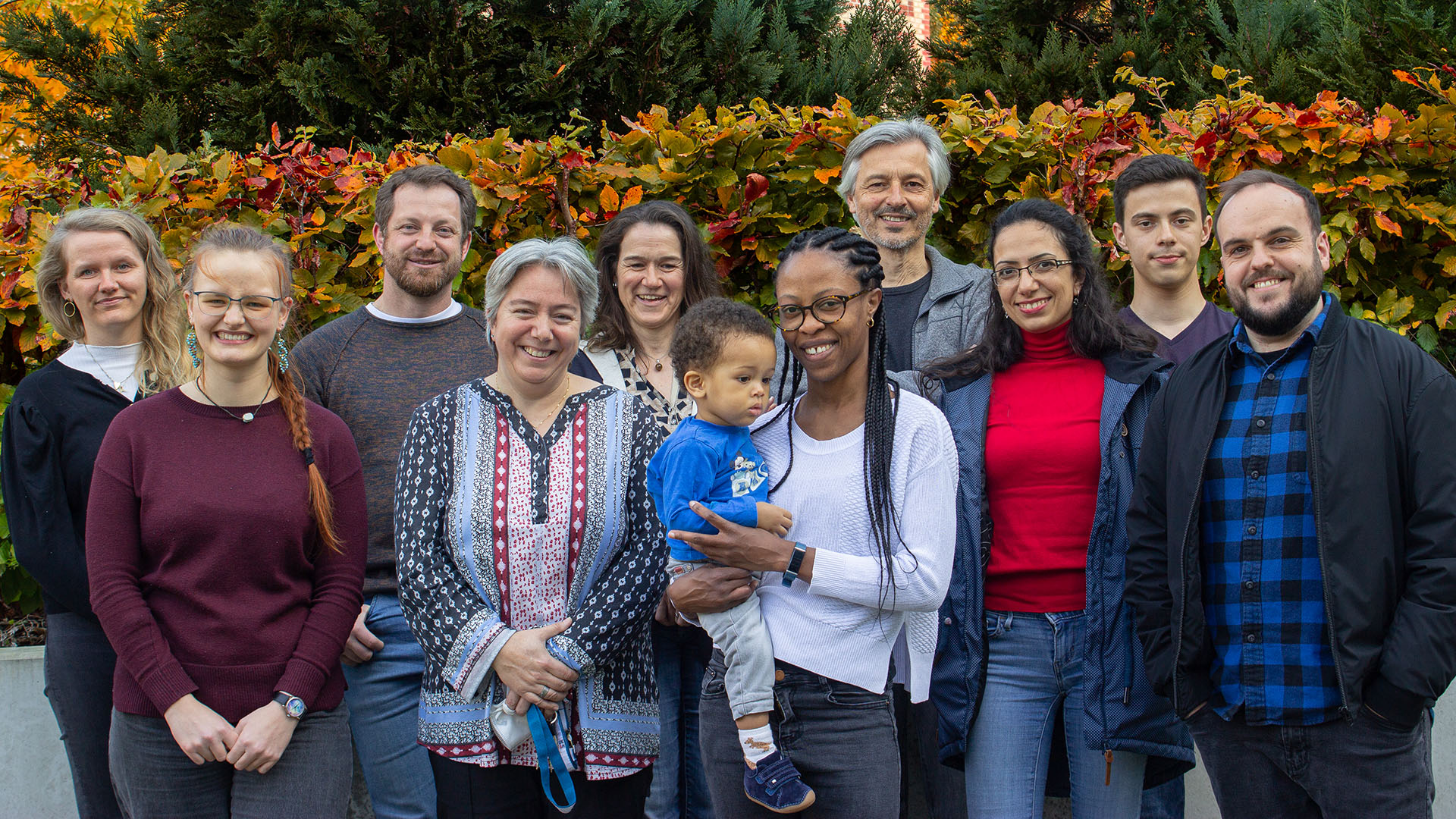
T-helper cells direct protective and pathological immune responses and represent central targets for the diagnosis and therapy of autoimmunity, allergy and chronic inflammatory diseases. By precisely characterizing disease-relevant antigen-specific T cells, we aim to understand the cause of such immune pathologies and address them therapeutically.
Group leader:
,
Group members:
,
,
,
,
,
,
,
,
,
,
Immune-mediated diseases, such as autoimmunity, allergies or chronic inflammation of various organ systems, are on the rise. Here, the immune system, which protects us from infections, mistakenly attacks harmless “antigens”, such as plant pollen or food, the body’s own structures and cells or the microbiota. The exact causes of these diseases are mostly unknown and vary from disease to disease and probably even from patient to patient. The immune cells that initiate or prevent these immune reactions are poorly characterized. For patients, this means that in the absence of detailed knowledge about the disease-causing cells, the immune system is therapeutically suppressed, usually for life and with adverse side effects. Symptoms are targeted instead of the disease cause. Our goal is tailor-made diagnostics and therapies, through the precise characterization of the disease-causing immune cells.
T helper (Th) cells organize the immune response specifically adapted to each antigen. Unwanted reactions against harmless antigens are actively suppressed by specialized regulatory T cells (Treg). If control is defective, pathogenic, pro-inflammatory effector T cells expand. Shutting down the disease by restoring natural antigen-specific control is ourtherapeutic goal.
For this purpose, we have developed sensitive methods to identify antigen-specific Th cells in humans that are relevant for the different diseases. This makes it possible to detect the cellular and molecular cause of specific immune pathologies and to target them therapeutically or to use them as diagnostic parameters. We have pursued this approach in a wide variety of disease situations, such as COVID-19, allergies, tuberculosis, invasive fungal infections, and autoimmunity. Based on these results, we are working on new antigen-specific diagnostic and therapeutic options to eliminate causes of disease.
Saggau C, Martini GR, Rosati E, Meise S, Messner B, Kamps AK, Bekel N, Gigla J, Rose R, Voß M, Geisen UM, Reid HM, Sümbül M, Tran F, Berner DK, Khodamoradi Y, Vehreschild MJGT, Cornely O, Koehler P, Krumbholz A, Fickenscher H, Kreuzer O, Schreiber C, Franke A, Schreiber S, Hoyer B, Scheffold A, Bacher P. Immunity. 2022 Aug 12;S1074-7613(22)00396-X. doi: 10.1016/j.immuni.2022.08.003. Online ahead of print.
Mantei A, Meyer T, Schürmann M, Beßler C, Bias H, Krieger D, Bauer T, Bacher P, Helmuth J, Volk HD, Schürmann D, Scheffold A, Meisel C. Eur Respir J. 2022 Jul 28;60(1):2101780. doi: 10.1183/13993003.01780-2021. Print 2022 Jul.
Ahlers J, Mantei A, Lozza L, Stäber M, Heinrich F, Bacher P, Hohnstein T, Menzel L, Yüz SG, Alvarez-Simon D, Bickenbach AR, Weidinger C, Mockel-Tenbrinck N, Kühl AA, Siegmund B, Maul J, Neumann C, Scheffold A. Mucosal Immunol. 2022. doi: 10.1038/s41385-022-00487-x.
Bacher P, Rosati E, Esser D, Rios-Martini G, Saggau C, Schiminsky E, Dargvainiene J, Schöder I, Wieters I, Khodamoradi Y, Eberhardt F, Vehreschild MJGT, Neb H, Sonntagbauer M, Conrad C, Tran F, Rosenstiel P, Markewitz R, Wandinger, K-P, Augustin M, Rybniker J, Kochanek M, Leypoldt F, Cornely OA, Koehler P, Franke A, Scheffold A. Immunity 2020. 53(6):1258-1271.e5
5. Human Anti-fungal Th17 Immunity and Pathology Rely on Cross-Reactivity against Candida albicans
Bacher P, Hohnstein T, Beerbaum E, Röcker M, Blango MG, Kaufmann S, Röhmel J, Eschenhagen P, Grehn C, Seidel K, Rickerts V, Lozza L, Stervbo U, Nienen M, Babel N, Milleck J, Assenmacher M, Cornely OA, Ziegler M, Wisplinghoff H, Heine G, Worm M, Siegmund B, Maul J, Creutz P, Tabeling C, Ruwwe-Glösenkamp C, Sander LE, Knosalla C, Brunke S, Hube B, Kniemeyer O, Brakhage AA, Schwarz C, Scheffold A. Cell. 2019; 176(6):1340-1355.e15.
Neumann C, Blume J, Roy U, Teh PP, Vasanthakumar A, Beller A, Liao Y, Heinrich F, Arenzana TL, Hackney JA, Eidenschenk C, Gálvez EJC, Stehle C, Heinz GA, Maschmeyer P, Sidwell T, Hu Y, Amsen D, Romagnani C, Chang HD, Kruglov A, Mashreghi MF, Shi W, Strowig T, Rutz S, Kallies A, Scheffold A.Nat Immunol. 2019 Apr;20(4):471-481. doi: 10.1038/s41590-019-0316-2. Epub 2019 Feb 18.PMID: 30778241
7. Regulatory T Cell Specificity Directs Tolerance versus Allergy against Aeroantigens in Humans
Bacher P, Heinrich F, Stervbo U, Nienen M, Vahldieck M, Iwert C, Vogt K, Kollet J, Babel N, Sawitzki B, Schwarz C, Bereswill S, Heimesaat MM, Heine G, Gadermaier G, Asam C, Assenmacher M, Kniemeyer O, Brakhage AA, Ferreira F, Wallner M, Worm M, Scheffold A.Cell. 2016 Nov 3;167(4):1067-1078.e16. doi: 10.1016/j.cell.2016.09.050. Epub 2016 Oct 20.PMID: 27773482
8. Role of Blimp-1 in programing Th effector cells into IL-10 producers
Neumann C, Heinrich F, Neumann K, Junghans V, Mashreghi MF, Ahlers J, Janke M, Mockel-Tenbrinck N, Kühl A, Heimesaat M, Esser C, Im SH, Radbruch A, Rutz S and Scheffold A. J Exp Med. 2014 211(9):1807-19.
DFG
BMBF:
University Hospital Schleswig-Holstein
Institute of Immunology
Arnold-Heller-Straße 3
Haus U30
24105 Kiel